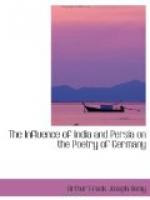[205] Aus dem Nachlasse Mirza Schaffys, Berl. 1874, pp. 191-223.
[206] In ZDMG. vol. xxiv. pp. 425-432.
[207] With few exceptions, pointed out by Bodenstedt himself, e.g. “Mullah rein ist der Wein” is from the Tartaric. Nachlass, p. 208.
[208] Friedr. Bodenstedts Gesammelte Schriften, Berlin, 1865, 12 vols. Vols. i and ii. All references to the Lieder des M.S. are to this edition.
[209] Nachlass, p. 193.
[210] Or else a saying of Muhammad exactly like it, cited by Prof. Brugsch in Aus dem Morgenlande, Lpz. Recl. Univ. Bibl. 3151-2, p. 57.
[211] Cf. Bodenstedt’s remarks on Sufism in Nachtrag, p. 198 seq.
[212] See my article on Religion of Ancient Persia in Progress, vol. iii. No. 5, p. 290.
[213] A complete history of Sa’di’s life, drawn from his own writings as well as other sources, is given by W. Bacher, Sa’di’s Aphorismen und Sinngedichte, Strassb. 1879. On the relation of the poet to the rulers of his time, see esp. p. xxxv seq.
[214] We cite from the third edition, 1887.
[215] Translated more closely by Bodenstedt in Die Lieder und Sprueche des Omar Chajjam, Breslau, 1881, p. 29.
[216] Schlechta-Wssehrd, Ibn Jemins Bruchstuecke. Wien, 1852, pp. 138, 139.
[217] Tr. David Shea, Hist. of the Early Kings of Persia, Lond. 1832, pp. 102-104; Malcolm. i. p. 10, note b.
[218] Ethe in Grdr. iran. Phil. ii. p. 260; Pizzi, Storia, vol. i. pp. 88, 215.
[219] Rueckert, Gram. Poet. u. Rhet. der Perser, p. 363.
[220] Cf. the story of Charlemagne and the magic stone given to him by a grateful serpent. Grimm, Deutsche Sagen, 1. 130.
[221] We cite from an edition publ. at Leipzig, no date.
CHAPTER XI.
THE MINOR ORIENTALIZING POETS.
SOME LESS KNOWN POETS WHO ATTEMPTED THE ORIENTAL MANNER.
To enumerate the names of all the German poets who affected the Oriental manner would be to give a list of the illustrious obscure. Most of them have only served to furnish another illustration of Horace’s famous mediocribus esse poetis. A bare mention of such names as Loeschke, Levitschnigg, Wihl, Stieglitz and von Hermannsthal will suffice.[222] The last mentioned poet gives a striking illustration of the inanity of most of this kind of work. He uses the gazal form for stories about such persons as the Gracchi and Bluecher,[223] and, what is still more curious, for tirades against the Oriental tendency.[224] A poet of different calibre is Daumer, whose Hafis (Hamb. 1846) for a long time was regarded as a translation, whereas the poems of the collection are in reality original productions in Hafid’s manner, just like Rueckert’s Oestliche Rosen.[225] Their sensuous, passionate eroticism, however, is not a genuine Hafid quality, as we before have seen. The same criticism applies even much more forcibly to Schefer’s Hafis in Hellas (Hamburg, 1853).[226] Special mention is due to the gifted, but unfortunate, Heinrich Leuthold, whose Ghaselen deserve to be placed by the side of Platen’s. Like Platen and Rueckert, he too proclaims himself a reveller:




